Order-4-4 pentagonal honeycomb
In the geometry of hyperbolic 3-space, the order-4-4 pentagonal honeycomb a regular space-filling tessellation (or honeycomb). Each infinite cell consists of a pentagonal tiling whose vertices lie on a 2-hypercycle, each of which has a limiting circle on the ideal sphere.
| Order-4-4 pentagonal honeycomb | |
|---|---|
| Type | Regular honeycomb |
| Schläfli symbol | {5,4,4} {5,41,1} |
| Coxeter diagram | |
| Cells | {5,4} 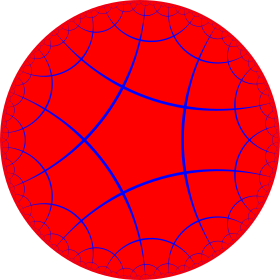 |
| Faces | {5} |
| Vertex figure | {4,4} |
| Dual | {4,4,5} |
| Coxeter group | [5,4,4] [5,41,1] |
| Properties | Regular |
Geometry
The Schläfli symbol of the order-4-4 pentagonal honeycomb is {5,4,4}, with four order-4 pentagonal tilings meeting at each edge. The vertex figure of this honeycomb is a square tiling, {4,4}.
 Poincaré disk model |
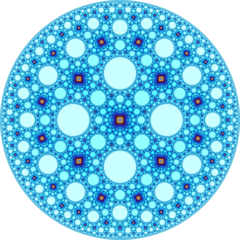 Ideal surface |
Related polytopes and honeycombs
It is a part of a series of regular polytopes and honeycombs with {p,4,4} Schläfli symbol, and tetrahedral vertex figures:
| {p,4,4} honeycombs | ||||||
|---|---|---|---|---|---|---|
| Space | E3 | H3 | ||||
| Form | Affine | Paracompact | Noncompact | |||
| Name | {2,4,4} | {3,4,4} | {4,4,4} | {5,4,4} | {6,4,4} | ..{∞,4,4} |
| Coxeter |
||||||
| Image | 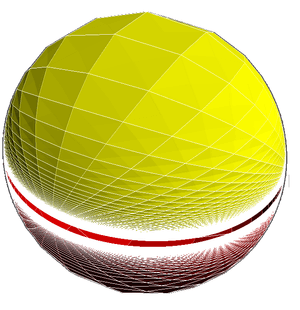 |
 |
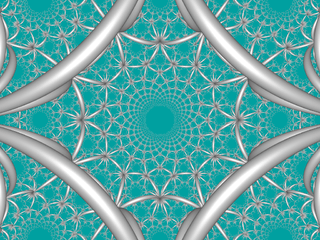 |
 |
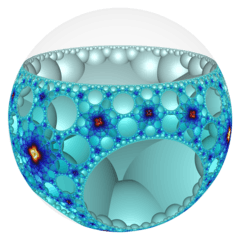 |
 |
| Cells | 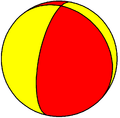 {2,4} |
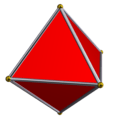 {3,4} |
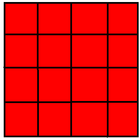 {4,4} |
 {5,4} |
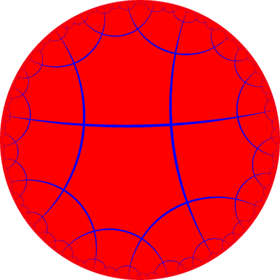 {6,4} |
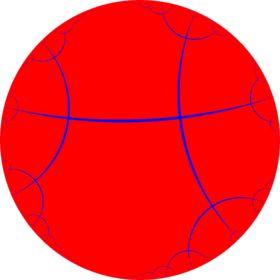 {∞,4} |
Order-4-4 hexagonal honeycomb
| Order-4-4 hexagonal honeycomb | |
|---|---|
| Type | Regular honeycomb |
| Schläfli symbol | {6,4,4} {6,41,1} |
| Coxeter diagram | |
| Cells | {6,4}  |
| Faces | {6} |
| Vertex figure | {4,4} |
| Dual | {4,4,6} |
| Coxeter group | [6,4,4] [6,41,1] |
| Properties | Regular |
In the geometry of hyperbolic 3-space, the order-4-4 hexagonal honeycomb a regular space-filling tessellation (or honeycomb). Each infinite cell consists of an order-4 hexagonal tiling whose vertices lie on a 2-hypercycle, each of which has a limiting circle on the ideal sphere.
The Schläfli symbol of the octagonal tiling honeycomb is {6,4,4}, with three octagonal tilings meeting at each edge. The vertex figure of this honeycomb is a square tiling, {4,4}.
 Poincaré disk model |
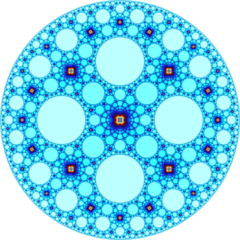 Ideal surface |
Order-4-4 apeirogonal honeycomb
| Order-4-4 apeirogonal honeycomb | |
|---|---|
| Type | Regular honeycomb |
| Schläfli symbol | {∞,4,4} {∞,41,1} |
| Coxeter diagram | |
| Cells | {∞,4}  |
| Faces | {∞} |
| Vertex figure | {4,4} |
| Dual | {4,4,∞} |
| Coxeter group | [∞,4,4] [∞,41,1] |
| Properties | Regular |
In the geometry of hyperbolic 3-space, the order-4-4 apeirogonal honeycomb a regular space-filling tessellation (or honeycomb). Each infinite cell consists of an order-4 apeirogonal tiling whose vertices lie on a 2-hypercycle, each of which has a limiting circle on the ideal sphere.
The Schläfli symbol of the apeirogonal tiling honeycomb is {∞,4,4}, with three order-4 apeirogonal tilings meeting at each edge. The vertex figure of this honeycomb is a square tiling, {4,4}.
 Poincaré disk model |
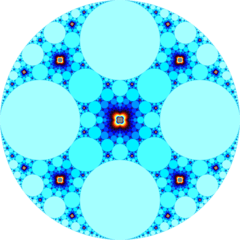 Ideal surface |
See also
- Convex uniform honeycombs in hyperbolic space
- List of regular polytopes
References
- Coxeter, Regular Polytopes, 3rd. ed., Dover Publications, 1973. ISBN 0-486-61480-8. (Tables I and II: Regular polytopes and honeycombs, pp. 294–296)
- The Beauty of Geometry: Twelve Essays (1999), Dover Publications, LCCN 99-35678, ISBN 0-486-40919-8 (Chapter 10, Regular Honeycombs in Hyperbolic Space) Table III
- Jeffrey R. Weeks The Shape of Space, 2nd edition ISBN 0-8247-0709-5 (Chapters 16–17: Geometries on Three-manifolds I,II)
- George Maxwell, Sphere Packings and Hyperbolic Reflection Groups, JOURNAL OF ALGEBRA 79,78-97 (1982)
- Hao Chen, Jean-Philippe Labbé, Lorentzian Coxeter groups and Boyd-Maxwell ball packings, (2013)
- Visualizing Hyperbolic Honeycombs arXiv:1511.02851 Roice Nelson, Henry Segerman (2015)
External links
- John Baez, Visual insights: {7,3,3} Honeycomb (2014/08/01) {7,3,3} Honeycomb Meets Plane at Infinity (2014/08/14)
- Danny Calegari, Kleinian, a tool for visualizing Kleinian groups, Geometry and the Imagination 4 March 2014.